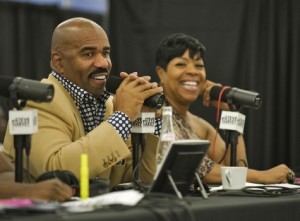Steve Harvey and the Enterprise of Black Female Discipline
 “It’s a male perspective. That’s missing in daytime television, having a man share with women some of the thoughts from a man’s angle, but coming from a guy who’s also very empowering for women. And I’m going to be pretty funny.” – Steve Harvey.
“It’s a male perspective. That’s missing in daytime television, having a man share with women some of the thoughts from a man’s angle, but coming from a guy who’s also very empowering for women. And I’m going to be pretty funny.” – Steve Harvey.
Steve Harvey was once most recognizable for his wit, sarcasm, and refreshing take on everyday life situations–the usual things that make comedians successful. Today the actor, comedian, game show host, New York Times Bestselling author, and media entrepreneur is most well known for his relationship advice. After a mild career slump in the mid 2000s, Harvey’s shift to focus on (mostly black) women with problems led to a career revival. This fall Harvey continues to expand his brand with a nationally syndicated talk show, Steve Harvey. The show, which posted the best first week ratings since the premier of Dr. Oz (until Katie debuted a week later), is evidence that Harvey has surpassed his rank as a “king of comedy” and laid the foundation for a multi-platform media empire. The key building block on Harvey’s climb from comedian to relationship expert stardom: black women.
Harvey first aired his nationally syndicated radio show in the year 2000. Tapping into what media scholar Janice Peck (1995) has described as “therapeutic discourse” popular in the talk show genre, Harvey and co-host Shirley Strawberry introduced “The Strawberry Letter”—a segment featuring a letter from a (female) listener seeking a balm for her troubles.
In every segment, Harvey performs the last word in a style that borrows from the matter-of-fact, down-home vernacular reminiscent of Dr. Phil McGraw, mixed with the roaring declaratives he employs in comedy routines. To a letter entitled, “Pregnant by my Son-in-law,” Harvey responded: “What is yo’ ass doing? First off all you said I’m a 47-year-old attorney. Let’s start this letter off the right way; you’re a 47-year-old stupid attorney. You’re stupid. You’re stupid; you’re trifling; you’re raggedy.” Beginning his response with such a critique marks the parameters of the problem as within the woman’s own moral deficiencies and normalizes the public (albeit anonymous) rebuke and correction of a woman with complex intimate troubles.
After pausing for a commercial break, Harvey ends his thrashing with laughter:
The third son-in-law has got to be sitting down sucking his thumb, just wondering, when is his shot at the Promised Land coming…I hate to tell you this, but you ain’t a lawyer—you a one woman wrecking crew slash escort service (Harvey).
The chorus of laughter and panting from Harvey’s in-studio co-hosts drives the final moment to climax. Laughter here is not merely background noise; it is emphasized as an indicator that the listening audience should join in the moment of amusement. Any woman crazy enough to have an affair with her daughter’s husband, the exercise suggests, deserves our collective mocking. In the end Steve Harvey emerges as an expert in “common sense,” fit to call women on their foolishness one public disciplining at a time.
 The success of the Strawberry Letter segment led to two books, both bestsellers, and a film, Think Like a Man (Sony/Screen Gems 2012), which feature Harvey as the friendly voice of truth among the masses of confused and lonely women. The film is punctuated by various Harvey-isms that pathologize the black female leads. In these various platforms, including the new talk show, there is little discussion of what (dis)qualifies Harvey as a coach in human relationships, including the fact that he has had two failed marriages. Rather Harvey claims that his is a “common sense approach” substantiated by 55 years of broad life experiences.
The success of the Strawberry Letter segment led to two books, both bestsellers, and a film, Think Like a Man (Sony/Screen Gems 2012), which feature Harvey as the friendly voice of truth among the masses of confused and lonely women. The film is punctuated by various Harvey-isms that pathologize the black female leads. In these various platforms, including the new talk show, there is little discussion of what (dis)qualifies Harvey as a coach in human relationships, including the fact that he has had two failed marriages. Rather Harvey claims that his is a “common sense approach” substantiated by 55 years of broad life experiences.
Harvey’s stake in the daytime talk show market is notable because, as an African American male, he is breaking ground in what is currently a predominantly white and female genre. It seems reasonable then that his show would follow the conventions of daytime talk “whereby females are assigned more responsibility for emotional and relational work, and, because of their subordinate status are taught to seek and accept (male) help for their problems” (Peck 60). Yet I argue that Harvey’s empire relies on a particular kind of black gender socialization where black women are subject to a specifically racialized critique.
Harvey is one of a group of African American men that have increased their marketability as national media personalities by critiquing single black women as helpless patients, and offering personalized solutions to their supposed relationship ailments. Hill Harper—actor and author of the best-selling book, The Conversation: How Black Men and Women Can Build Loving, Trusting Relationships—and Jimi Izrael—journalist and author of The Denzel Principle: Why Black Women Can’t Find Good Black Men—are two of the other men who, despite their lack of professional credibility and status as single men, join Harvey in narrating black women’s love lives. Harvey and his cohort turn a profit because they offer an authentic black response to what is deemed a threat to the black community: unmarried black women.
While it feels natural to celebrate the advance in African American representation demonstrated by Harvey’s multifaceted empire, the black feminist in me wonders if his large steps forward will mean a step backward for black women in media.
[This is part one of a two-part series on Steve Harvey – check back next week for the second installment]



[…] At the Critical Studies in Television website, this week the Telegenic blog offered a sneak preview of the first episode of Homeland, season 2. The Tragic Beauty of Ken Burns’ The Dust Bowl (2012) by Gary R Edgerton is another advance preview. And Television Wetness by Sean Redmond is a playful look at TV and water. There is also the usual CSTV round up of CFPs, conference announcements and news. There was further coverage of US Premiere Week 2012: ABC and Premiere Week 2012: CBS at AntennaBlog, where Timeka Williams also takes a good look at daytime TV in “Steve Harvey and the Enterprise of Black Female Discipline“. […]